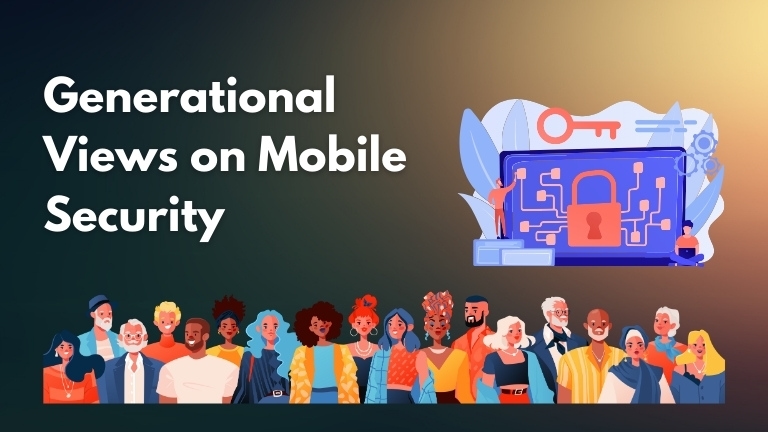Different generations interact with mobile technology in unique ways, and their approaches to mobile security risks also vary. While technology continues to advance, younger people often underestimate the threats, making them more susceptible to falling for scams. Surprisingly, Millennials are more likely to experience identity theft than older adults. On the other hand, older generations tend to be more cautious and mindful of online dangers, reflecting a more conservative approach to mobile security.
Yet, there is still more to unfold about the generational perspective on the matter. This article will explore how different the understanding of mobile security risks can be by age group. We will look at common threats, habits, and attitudes towards mobile security across generations.
What are the most common mobile security threats?
Before we discuss the habits each age group is in, let’s recognize some of the most common mobile security threats that anybody, regardless of generation, can fall for.
- Phishing: Fraudulent messages designed to trick users into revealing various personal information. It can be in the form of calls, messages, or emails.
- Spyware: Programs that secretly collect user information and activities.
- Data leakage: Unauthorized data sharing or access through unsecured apps.
- Network spoofing: Fake Wi-Fi networks created to intercept user data.
- Rogue apps: Malicious apps disguised as legitimate ones, often found in third-party app stores.
- Bluetooth hacking: Exploiting Bluetooth connections to access devices and data.
While the list seems daunting, these risks are not impossible to avoid. Here are a few simple steps to consider:

- Use strong passwords: Avoid using the same password across multiple sites and create strong passwords. Password managers like Nordpass can help create unique passwords and save them in a secure vault.
- Enable Two-Factor Authentication (2FA): Adding an extra layer of security, such as 2FA, can help protect accounts even if passwords are compromised. This requires a second verification form, like a text message code or an authentication app.
- Regularly update software: Keep operating systems, apps, and antivirus software up to date. Updates often include security patches that protect against newly discovered threats.
How do generations position themselves against mobile dangers?
People have formed different relationships with mobile technology throughout generations. This is mainly because every generation has a different understanding, exposure, and experiences with mobile devices. Let’s break down each generation and understand where they stand when it comes to facing mobile security risks.
Baby Boomers
Baby boomers often approach mobile technology with caution. This generation has witnessed the rise of technology from its very beginning, which was influential on their careful behavior around mobile devices.
While baby boomers use fewer mobile features than younger generations, they spend a significant amount of time on their phones, about five hours per day. However, this generation seems to be prioritizing essential functions. For example, they spend more time emailing and making phone calls rather than exploring apps or social media platforms.
Overall, baby boomers’ wariness of new mobile features and preference for familiar, essential functions underscore their cautious approach to mobile security. While this behavior sometimes limits their engagement with the latest technology, it also serves as a protective measure against mobile security threats.
Generation X
Often referred to as “digital immigrants,” Gen Xers have adjusted to the explosive development of technology. Mobile technology wasn’t always there for them, so as adults, they had to catch up with the new tech and learn. They exhibit a unique blend of caution and adaptability when it comes to using mobile phones.
This background helps one approach mobile security carefully. Many in this age group value security and privacy above more modern, maybe dangerous programs and platforms; they also frequently favor more established means of communication, including email and phone conversations.
Usually, having learned from past failures, Generation X is quite knowledgeable in cybersecurity techniques. They are more likely to follow security policies both at home and at work and are alert about common mobile security threats like phishing.
Millennials
Often referred to as Millenials, Gen Y-born people have grown up with the development of digital technologies. They are known for early adoption of new technologies, from the internet to smartphones. Their technological knowledge, however, might occasionally cause a false sense of security that increases their vulnerability to particular mobile risks.

Heavy consumers of mobile devices, members of this generation utilize them for social media, banking, and communication, among other purposes. Often online virtually constantly, they are more likely than previous generations to be smartphone users. However, Millennials are a potential target for cyberattacks as they depend on mobile technologies for daily tasks.
Though tech-savvy, millennials might be prone to security concerns. They could be victims of phishing schemes and other cyberattacks, particularly if they believe they are more informed than they are. However, with their familiarity with tech, they can easily adopt tools like 2FA, password managers, and VPNs.
Generation Z
Generation Z is the first true generation of digital natives. Growing up with cell phones, social media, and continuous internet access, they are quite skilled with current technology.
Gen Z interacts most with technology through cell phones and social media channels. With the majority of teenagers having access to smartphones, members of this generation are practically always connected. Their pervasive use makes them especially vulnerable to mobile attacks. Though they use the internet often, Gen Zers may lack cybersecurity knowledge.
However, Gen Z has a complex attitude to security and privacy. One may argue that compared to previous generations, people are more prone to reveal personal information online, so they expose themselves to greater social engineering threats. At the same time, they are also wary of the mobile apps they download and the permissions they grant. In addition, they are more likely to use sophisticated security measures such as two-factor authentication.
Conclusion
In the digital age, knowing how various generations view and react to mobile security challenges is absolutely vital. Although every age has different customs and weaknesses, knowledge and education can greatly improve their security methods.

1 Comment
It’s funny how younger people care more about convenience with their phones, but older folks are more worried about security threats. Different generations, different priorities!